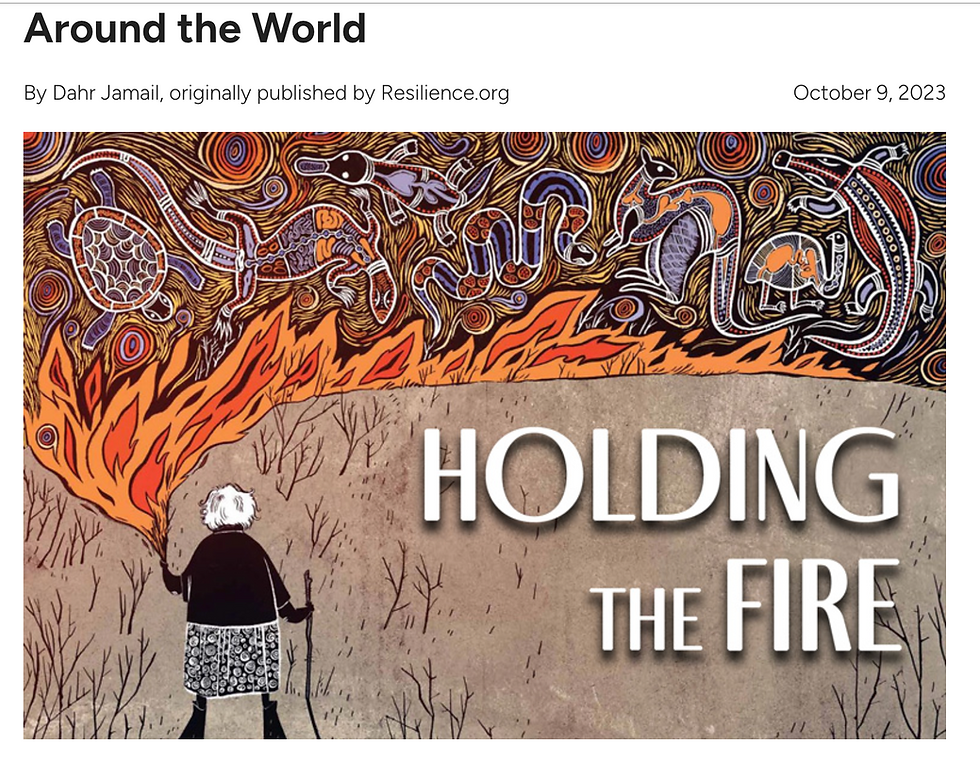Holding the fire: Indigenous voices on the great unraveling
- Phoebe Barnard
- Oct 9, 2023
- 2 min read
Updated: Oct 26, 2023

This podcast by Dahr Jamail is an important reflection on our tragic and yet galvanizing times. Click here to listen. This was first published today, 9 October 2023 on Resilience.org.
And do make sure you check out this northern summer's report by Asher Miller and Stable Planet Alliance patron (and Post-Carbon Institute cofounder) Richard Heinberg: Welcome to the Great Unraveling: Navigating the Polycrisis of Environmental and Social Breakdown.
The following text describes the report, see here for order details.
During the 20th century, and especially the latter half of the century, humanity’s increasing adoption of fossil fuels as sources of cheap and abundant energy enabled rapid industrialization. The result was a massive increase in nearly all human activities and their ecological and social impacts, a process that has been called the Great Acceleration. The first two decades of 21st century saw a new phase of the Great Acceleration, with wars fought over the last sources of cheap oil, expensive and destructive exploitation of remaining natural resources, the massive use of debt and speculation to expand energy production and maintain economic growth, and the arrival of environmental and social impacts too overwhelming for even the world’s wealthiest and most powerful people and nations to ignore.
Now, in the 2020s, the Great Acceleration is losing steam and shows signs of reversing direction. Thought leaders and policy think tanks have invented a new word—polycrisis—to refer to the tangles of global environmental and social dilemmas that are accumulating, mutually interacting, and worsening. The central claim of this report is that the polycrisis is evidence that humanity is entering what some have called the Great Unraveling—a time of consequences in which individual impacts are compounding to threaten the very environmental and social systems that support modern human civilization. The Great Unraveling challenges us to grapple with the prospect of a far more difficult future, one of mutually exacerbating crises—some acute, others chronic—interacting across environmental and social systems in complex ways, at different rates, in many places, and with different results.
Welcome to the Great Unraveling is intended to help the general public—but particularly academics and researchers, environmental and social justice nongovernmental organizations and their funders, and the media—recognize what the Great Unraveling is, what it means for both human civilization and the global ecosystem, and what we can do in response. The paper calls attention to four main things:
the alarming, rapidly changing environmental and social conditions of the Great Unraveling;
the need to grapple with complexity, uncertainty, and conflicting priorities—hallmarks of the Great Unraveling;
the need to maintain social cohesion within societies and peaceful relations between them during the Great Unraveling, while implementing key changes in collective behavior and managing the negative consequences of past failures to act; and
the personal competencies that are needed to understand what’s happening during the Great Unraveling and to respond constructively, primarily by building household and community resilience for this precarious time.
Errata
In the original PDF version of the report released on June 15, 2023, the title of Figure 2 on page 7 should have read “Global total energy consumption growth…,” and the first paragraph on page 19 should have read “…13 percent of the global population, own 85.6 percent of overall wealth.” These errors are corrected in the print version and in all PDFs downloaded after July 7, 2023.









Comments